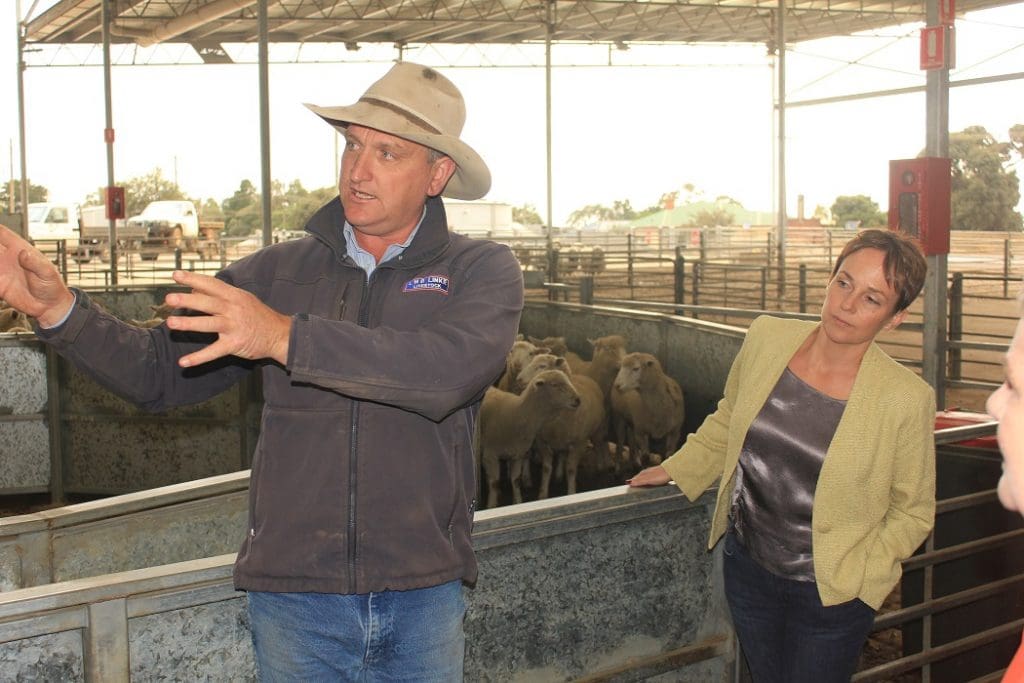
Former Hamilton Stock Agents Association president Bernie Grant explains the saleyards’ Hamilton Draft system to former Victorian Minister for Agriculture Jaala Pulford in 2018.
A SOUTH-WEST Victorian sheep saleyard has shown it is a national and world leader when it comes to electronic contact tracing of the ovine kind.
A record number of electronic sheep tags were successfully read through the Hamilton Regional Livestock Exchange in December last year.
Agriculture Victoria said sheep and lamb producers, staff and agents created an Australian record at Hamilton – with 59,487 electronic National Livestock Identification System (NLIS) tags being scanned on lambs sold on 15 December 2021.
During December 2021, about one million electronic NLIS (Sheep) tags were read in Victorian saleyards and abattoirs and movements uploaded to the NLIS database demonstrating wide-spread successful adoption by the industry.
Agriculture Victoria’s Manager Livestock Traceability, Ben Fahy, said electronic identification (EID) tagging and movement recording facilitate accurate ‘whole of life’ tracking of sheep and goats for food safety, disease control and market access purposes.
“Electronic tagging is an important tool in ensuring that Victorian sheep and goats can be quickly tracked in the event of a disease outbreak or food safety issue.
“Victorian saleyards have become world leaders in this area,” he said.
“They have demonstrated repeatedly, and over a long time now, the ability to efficiently scan thousands of sheep on a daily basis.”
Agriculture Victoria said electronic tagging has been required in the United Kingdom for several years because of the role that sheep can play in the spread of infectious diseases such as foot-and-mouth disease (FMD). But unlike the situation in Victoria, saleyards in the UK typically only sell and scan fewer than 10,000 head at a sale.
Mr Fahy said the excellent traceability of Victoria’s system was demonstrated by the SAFEMEAT sheep traceability evaluation which showed that Victorian EID tagged sheep were 99 percent traceable, compared to 70pc traceability for interstate sheep that do not require electronic tags.
“The automatic verification of the presence of a sheep or goat at a saleyard following the scanning of its tag enables reliable traceback and facilitates prompt contact tracing in a disease emergency.
“Contact tracing where saleyards are involved in the recent movement history of sheep can only be done successfully with electronic tagging,” he said.
“The entire livestock supply chain should be congratulated for their efforts during Victoria’s implementation of an electronic NLIS (Sheep & Goats) system.”
Since 2017, producers have purchased more than 51 million electronic NLIS (Sheep) tags, and almost 35 million sheep and goat movements have been recorded on the NLIS database.
From 1 January 2022, all sheep and non-exempt goats need to be identified with an electronic NLIS (Sheep) tag before leaving a Victorian farm.
Agriculture Victoria said Victorian sheep and goat producers are able to access the most affordable electronic tags in Australia with prices starting from 77 cents per tag.
Visit the Agriculture Victoria website for more information on Victoria’s NLIS (Sheep & Goats) system or to order NLIS tags or phone Agriculture Victoria’s NLIS Helpline on 1800 678779 during business hours.

Does the EID system in Victoria follow through to the carcase, ie can any problems post-slaughter be traced back to an individual sheep, and from that, follow it back to its farm of origin? Note from editor: An Agriculture Victoria spokesperson told Sheep Central:
“The electronic NLIS (Sheep & Goat) system operating in Victoria allows for data to be collected against individual carcases.
Several Victorian sheep and goat processors have installed carcase tracking systems that have the ability to link an animal’s electronic NLIS (Sheep) tag to its carcase from the point of slaughter to the chiller or boning room. Processors can record carcase characteristics such as hot standard carcase weight and carcase defect information collected on the ‘retain rail’.
If they wish, processors can then provide this information, linked to sheep on an individual animal basis via their NLIS (Sheep) tag. This information can then be provided as part of feedback sheets sent directly to producers. They also have the option of providing this information to producers through the NLIS database or Livestock Data Link systems managed by Integrity Systems Company (ISC).”
Fantastic results, well done to all at Hamilton and the Victorian saleyards.